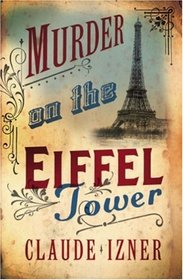Gerald G. (PhotoJer) reviewed Murder on the Eiffel Tower (Victor Legris, Bk 1) on + 92 more book reviews
Helpful Score: 3
This was a good read but not great...Interesting era, characters poorly developed, plot was unusual. Got bored and had to force myself to finish it.
This book is a splendid evocation of Paris during the Belle Époque, and Legris' frequent walks in various neighborhoods made me very happy indeed. The two women booksellers who write as Claude Izner bring their setting to life.
The mystery is also a good one. By the time I pieced all the clues together, it was almost time for the reveal. The list of suspects is a long one and represents almost all the various social strata in the city, which gives the authors more opportunity to depict their beloved Paris.
The one aspect of the book that I felt was lacking was the cast of characters. The only character in the entire book whom I felt had a real spark of life to him was Joseph, the assistant in Victor's bookshop. (While I'm on the subject of that bookshop, librarians and booksellers reading Murder on the Eiffel Tower will see that customers really haven't changed much from one century to another.) The main character, Victor Legris, is what I've always thought of as a boulevardier-- a man-about-town. He dresses well, he dines well, he has a mistress. Victor has many things and does many things (even deigning to work in his shop from time to time), but he still felt a bit two-dimensional, a bit reserved, as did everyone else.
As much as I loved mentally walking the streets of Paris in the late nineteenth century while solving an enjoyable mystery, it's the stiffness of the characters that will make me hesitate to continue with this series.
The mystery is also a good one. By the time I pieced all the clues together, it was almost time for the reveal. The list of suspects is a long one and represents almost all the various social strata in the city, which gives the authors more opportunity to depict their beloved Paris.
The one aspect of the book that I felt was lacking was the cast of characters. The only character in the entire book whom I felt had a real spark of life to him was Joseph, the assistant in Victor's bookshop. (While I'm on the subject of that bookshop, librarians and booksellers reading Murder on the Eiffel Tower will see that customers really haven't changed much from one century to another.) The main character, Victor Legris, is what I've always thought of as a boulevardier-- a man-about-town. He dresses well, he dines well, he has a mistress. Victor has many things and does many things (even deigning to work in his shop from time to time), but he still felt a bit two-dimensional, a bit reserved, as did everyone else.
As much as I loved mentally walking the streets of Paris in the late nineteenth century while solving an enjoyable mystery, it's the stiffness of the characters that will make me hesitate to continue with this series.
A woman dies on the Eiffel Tower during the 1889 Paris World Exposition, supposedly of a bee sting. I would have presumed it was an anaphylactic reaction, but not Victor Legris, a young used bookstore owner who follows lead after lead as more bee-sting deaths pile up. Is he attempting to clear the name of Kenji Mori, his surrogate father and bookstore business partner, or that of his new love interest Tasha, illustrator at his friend's new sensationalist newspaper, Le Passepartout? It's sometimes unclear what Victor is doing, even to himself, as he follows whatever trail he picks up through nineteenth century Paris. The novel's great strength is its tour of the City of Lights, meticiously researched by two Parisian used bookselling sisters using Claude Izner as their nom de plume. More of Victor Legris's adventures follow in seven planned sequels.




